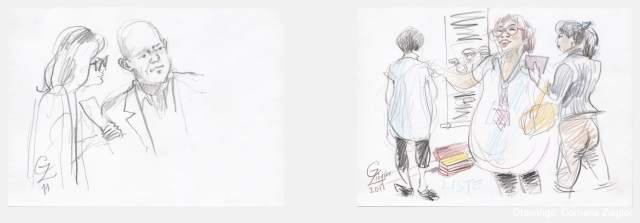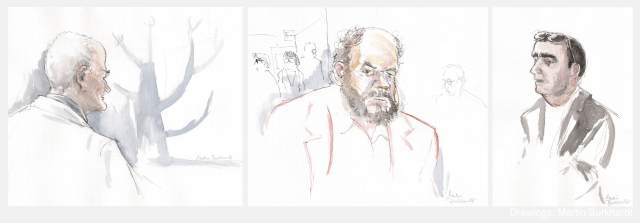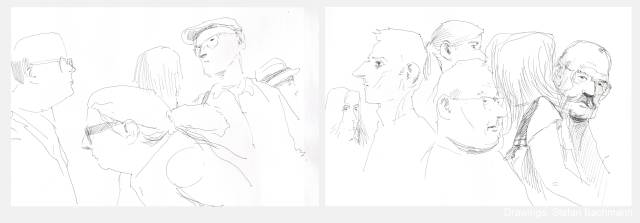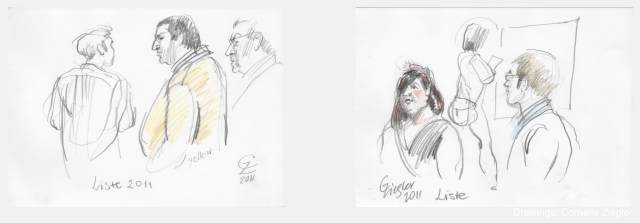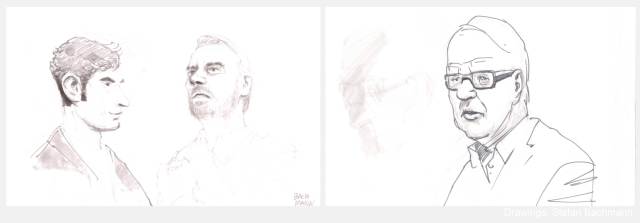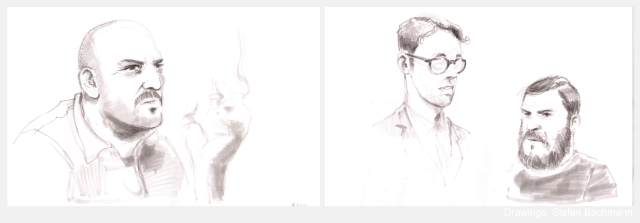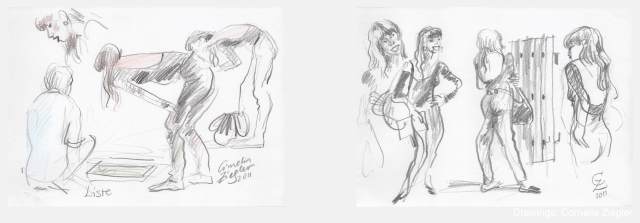Before the Private View
SCENE—LADY ___’S BOUDOIR. Lady ___ and Miss ___ discovered sipping five o’clock tea.
Miss ___ (sympathetically). I am so sorry, dearest, that you have sprained your ankle. And is it quite out of the question to come on Monday?
Lady ___. Quite, dearest. The doctor says I shall be laid up the whole Season if I move a step. So you will tell me all about the Private View, now won’t you?
Miss ___. Of course I will do my best; but you know my forte is not description. What do you want to know?
Lady ___. Why, of course, who were there, and what they said, and (most important of all) what they wore. I hope, dear, you will notice if they are wearing any of the new-fashioned bonnets, and if hats are going out.
Miss ___. You may rely upon me, darling.
Lady ___. And mind you get at the last bit of scandal. There ought to be plenty about, now that people have come back from the Riviera. But, my dear, you know exactly what I should like, so it is useless to prompt you. I leave everything to your discretion.
Miss ___. Quite so, darling. (After a pause.) I thought I had forgotten something—how about the paintings?
Lady Hay. Oh, never mind them! They will keep until another occasion!
[And as they will, Scene closes in on the Pictures.
Development
[“EVEN A COLOUR-SENSE is more important in the development of the individual than a sense of right and wrong.”—OSCAR WILDE.]
If you’re anxious to develop to a true hedonic “swell,” hop on a pinnacle apart,
Like a monkey on a stick, and your phrases quaintly pick, and then prattle about Art.
Take some laboured paradoxes, and, like Samson’s flaming foxes, let them loose amidst the corn
(Or the honest commonplaces) of the Philistines whose graces you regard with lofty scorn.
And every one will say,
As you squirm your wormy way,
“If this young man expresses himself in terms that stagger me,
What a very singularly smart young man this smart young man must be!”
You may be a flabby fellow, and lymphatically yellow, that will matter not a mite.
If you take yourself in hand, in a way you’ll understand, to become a Son of Light.
On your crassness superimposing the peculiar art of glosing in sleek phrases about Sin.
If you aim to be a Shocker, carnal theories to cocker is the best way to begin.
And every one will say,
As you worm your wicked way,
“If that’s allowable for him which were criminal in me,
What a very emancipated kind of youth this kind of youth must be.”
Human virtues you’ll abhor all, and be down upon the Moral in uncompromising style.
Your critical analysis will reduce to prompt paralysis every motor that’s not vile.
You will show there’s naught save virtue that can seriously hurt you, or your liberty enmesh;
And you’ll find excitement, plenty, in Art’s dolce far niente, with a flavour of the flesh.
And every one will say,
As you lounge your upward way,
“If he’s content with a do-nothing life, which would certainly not suit me.
What a most particularly subtle young man this subtle young man must be!”
Then having swamped morality in “intensified personality” (which, of course, must mean your own),
And the “rational” abolished and “sincerity” demolished, you will find that you have grown
With a “colour-sense” fresh handselled (whilst the moral ditto’s cancelled) you’ll develop into—well,
What Philistia’s fools malicious might esteem a vaurien vicious (alias “hedonic swell”).
And every one will say,
As you writhe your sinuous way.
“If the highest result of the true ‘Development’ is decomposition, why see
What a very perfectly developed young man this developed young man must be.”
With your perky paradoxes, and your talk of “crinkled ox-eyes,” and of books in “Nile-green skin.”
That show forth unholy histories, and display the “deeper mysteries” of strange and subtle Sin.
You can squirm, and glose, and hiss on, and awake that nouveau frisson which is Art’s best gift to life.
And “develop”—like some cancer (in the Art-sphere) whose best answer is the silent surgeon’s knife!
And every man will say,
As you wriggle on your way,
“If ’emotion for the sake of emotion is the aim of Art,’ dear me!
What a morbidly muckily emotional young man the ‘developed’ young man must be!”
The Trivial Round
BEING THE UTTERANCES OF MRS. ________ _____. [Not Intended for Publication.]
Well, there, my dear child, it’s no use making a fuss about it—one must do it, and there’s an end of it! People in our position ought to be ready to make some sacrifice for Art. I ordered luncheon half-an-hour earlier on purpose. Last year I only did thirty _______, and I want to do much more than that this afternoon, if I can. Of course, I know I shall be a perfect wreck to-morrow, but one expects that. I’m sure ________ is out of temper already—I can tell by the way he is driving. Yes, this will do nicely, ________; we will walk the rest. Quite a string of carriages, you see. It would never have done to have left Mr. _______ out! No, he didn’t exactly send me a card, but I’ve met him somewhere, and that does quite as well. Oh, my dear, it will be all right; keep close to me, and you needn’t even open your lips. Very tastefully decorated, isn’t it? Eccentric, of course, but they’re all like that. Such a mass of azaleas. I daresay they’re only hired for the ______, you know, but a very charming effect. Straight on to the ______? Thank you, I know the way perfectly. How are you, dear Mr. _______? I couldn’t dream of leaving you out, you know. My daughter. Thanks; but I can see beautifully where I am. Oh, of course I recollect the subject. How clever of you to choose it, and how originally you’ve treated it, too! Not for the _______? Why, surely they’d never reject that! Oh, because of the glass? I see. Well, I think all pictures ought to be glazed, myself—such an improvement. Good-bye, such a pleasure to have seen it; so many thanks. _______, dear, you must really tear yourself away. So many places to go to; good-bye, good-bye!… Well, to tell you the truth, my dear, the glass got in the way, and I’ve no more idea what the picture was about than you have. Still, I’m very glad we went in, all the same. Now where shall we go next? Most of the people seem going into that ______ across the ____, so there’s sure to be something worth seeing there. No, I don’t know whose it is, but what does that matter? they’re always glad to see you on ____ ______….
_______, my dear, I don’t like to see you putting yourself forward so much at your age. Of course I knew as well as you did that it wasn’t James the First that Monmouth rebelled against, though I’m not in the school-room. It’s not at all pretty of you to correct your mother in that ostentatious manner, and don’t let it occur again. There, you needn’t say another word. We’ll just pop in here for a minute, and then we must drive on somewhere else. I wish I could see you taking more interest in Art, _______. I thought you would enjoy being taken out like this!… Well, yes, I think we will have just a cup…. Good-bye—thank you so much—quite the pictures of the year. Such a treat—oh, not at all—I never flatter…. By the way, _______, did we go up and see his pictures? I thought not. I was dying for a cup of tea, and so,—and then, meeting Mr. _______ ____ in the hall like that, I naturally congratulated him. Oh, nonsense—we can’t go back now—we shall see them some time, I daresay. I wish I could get _________ to send me up some of that pretty pinky-coloured cake for my afternoons—it was really quite nice. If I had only thought of it, I would have asked Mr. ____ how it was made. And what becoming caps those maids had on! Models, no doubt.
Quite a distinguished gathering, wasn’t it, _______? So pleasant coming across dear Lady _________ like that. Your father and I met her in the Riviera, you know. She knew me directly I introduced myself. That’s one thing about Art, it does bring you into the very best society. No, I can’t say I cared much about his pictures this year—portraits are so very uninteresting, you know—they tell you nothing, unless you happen to know the people, and then you never recognise them. I thought all his were dreadful. Oh, I know I said I should expect to see them all hung on the line—but what of that? One can’t be perfectly candid in the world, my dear, much as one would wish to be. What is that you’re saying? “On the Hanging Committee this year?” How can you possibly know? “You heard him say so?” Then you ought to have stopped me, instead of standing there like a shy school-girl. Not that he would think I meant anything by a remark like that—why should he? I’m sure I tried to say everything that was pleasant!
I hope I am the last person to practise insincerity, my dear,—it’s a thing I have the greatest horror of. Only one doesn’t like to hurt people’s feelings, don’t you see? One can only just hint that a picture isn’t quite—especially when one doesn’t pretend to know much about it. Not that I am incapable of speaking out when I feel it my duty. If one sees where a little improvement would make all the difference, one ought to mention it. And Artists are so grateful for suggestions of that kind—they like to know how it strikes a perfectly fresh eye. I remember telling the _________ last year that one of his figures was just a leetle bit out of drawing, and that the folds of his drapery didn’t hang right, and he bowed most beautifully and thanked me—but when I came to see the picture exhibited, I found he hadn’t altered it a bit! So it really is hardly worth while speaking plainly—painters are so very opinionated.
What a long way it is to Mr. ________’s to be sure, and the afternoon turning quite chilly—don’t take all the rug, my dear, please!
Oh, don’t apologise, Mr. ________—quite light enough for me, I assure you. Thank you, I will sit down, we’ve been seeing pictures—good, bad, and indifferent—all the afternoon, so fatiguing, you know, so many ideas to grasp. I don’t mean that that’s the case with your pictures … Yes, very nice, charming. Let me see, didn’t you exhibit the large one last year? No? Ah! then it’s my mistake, I seem to have seen it so often before—a favourite subject with Artists, I suppose. So difficult to hit on anything really original nowadays. But I daresay you despise all that sort of thing. Well, good-bye, I mustn’t keep my ________ waiting any longer.
Perhaps, I was a little annoyed, my dear, never offering us a cup of tea or anything, after coming all that way, but I don’t think I showed it, did I? Yes, I am rather tired, and I really think that if it wasn’t that I can’t bear disappointing people, I should turn back now. But we must just drop in on that poor little Mr. __________, now we are so near. The poor man was so anxious that I should see his pictures—we needn’t stay long.
There, Mr. __________, you see I haven’t forgotten! though we’re rather late, and we shall have to drive back directly to dress—we’re dining out this evening, you know. What a nice ______! small, of course, but then you don’t want a large room, do you? What a quantity of pictures! How you must have worked! If you send in so many, one of them’s sure to get in, isn’t it? Still, I should have thought that if you had painted only one or two, and taken great pains with them, it might—oh, most of them are your friend’s? and only these two yours? Well, no doubt you are quite right not to be too ambitious. Why, this is quite charming—really quite charming, isn’t it, _______? Oh, I quite understand it isn’t yours, Mr. __________. I suppose your friend has been painting much longer than you have? No? really! Younger, is he? but some people have a natural turn for it, haven’t they? Have you had many visitors this afternoon? Ah, well, they will come some day, I daresay. Now I’m going to be very rude, and make a suggestion. Perhaps if you burnt one or two pastilles, or those Japanese joss-sticks, you know,—they’re quite cheap—you’d get rid of some of the smell of the paint and the cigarettes—or is it pipes? Oh, I don’t mind it, you know, but some do….
Poor dear fellow, I’m afraid he’ll never get on. And what a pig-stye to paint in! Well, I’m glad I’ve done my duty, _______. Mind you remember all the places we’ve been to. Home, please, ________.
Unnecessary Candour
CRITIC. “BY JOVE, HOW ONE CHANGES! I’VE QUITE CEASED TO ADMIRE THE KIND OF PAINTING I USED TO THINK SO CLEVER TEN YEARS AGO; AND VICE VERSÂ!”
Pictor. “THAT’S AS IT SHOULD BE! IT SHOWS PROGRESS, DEVELOPMENT! IT’S AN UNMISTAKABLE PROOF THAT YOU’VE REACHED A HIGHER INTELLECTUAL AND ARTISTIC LEVEL, A MORE ADVANCED STAGE OF CULTURE, A LOFTIER—”
Critic. “I’M GLAD YOU THINK SO, OLD MAN. BUT, CONFOUND IT, YOU KNOW!—THE KIND OF PAINTING I USED TO THINK SO CLEVER TEN YEARS AGO, HAPPENS TO BE YOURS!”
Voces Populi
VISITORS ASCENDING STAIRCASE, full of enthusiasm and energetic determination not to miss a single Picture, encounter people descending in various stages of mental and physical exhaustion. At the turnstiles two Friends meet unexpectedly; both being shy men, who, with timely notice, would have preferred to avoid one another, their greetings are marked by an unnatural effusion, and followed by embarrassed silence.
First Shy Man (to break the spell). Odd, our running up against one another like this, eh?
Second Shy Man. Oh, very odd. (Looks about him irresolutely, and wonders if it would be decent to pass on. Decides it will hardly do.) Great place for meeting, though.
First S. M. Yes; sure to come across somebody, sooner or later.
[Laughs nervously, and wishes the other would go.
Second S. M. (seeing that his friend lingers). This your first visit here?
First S. M. Yes. Couldn’t very well get away before, you know.
[Feels apologetic, without exactly knowing why.
Second S. M. It’s my first visit, too. (Sees no escape, and resigns himself.) Er—we may as well go round together, eh?
First S. M. (who was afraid this was coming—heartily). Good! By the way, I always think, on a first visit, it’s best to take a single room, and do that thoroughly. [This has only just occurred to him.
Second S. M. (who had been intending to follow that plan himself). Oh, do you? Now, for my part, I don’t attempt to see anything thoroughly the first time. Just scamper through, glance at the things one oughtn’t to miss, get a general impression, and come away. Then, if I don’t happen to come again, I’ve always done it, you see. But (considerately), look here. Don’t let me drag you about, if you’d rather not!
First S. M. Oh, but I shouldn’t like to feel I was any tie on you. Don’t you mind about me. I shall potter about in here—for hours, I daresay.
Second S. M. Ah, well (with vague consolation), I shall always know where to find you, I suppose.
First S. M. (brightening visibly). Oh dear, yes; I shan’t be far away.
[They part with mutual relief, only tempered by the necessity of following the course they have respectively prescribed for themselves. Nemesis overtakes the Second S. M. in the next Gallery, when he is captured by a Desultory Enthusiast, who insists upon dragging him all over the place to see obscure “bits” and “gems,” which are only to be appreciated by ricking the neck or stooping painfully.
Apparent Failure
[“THE PRIVATE VIEW was not a success…. The dresses which we noticed were very ordinary indeed.”—“Art Notes” in a Ladies’ Paper.]
Not a success—for every toilet there
Was commonplace and stupid, more or less;
A fact which clearly made the whole affair,
Not a success.
“Were not the pictures good?” Well, we confess
We know not, neither do we greatly care;
As writers for the fashionable Press,
Artistic knowledge falls not to our share;
We saw no novelties in hat or dress;
Therefore the Show is plainly, we declare,
“Not a success.”
Art, How She is Learned
SCENE—______. Time—any day of the Week between ____ ______ and _______ ______. Present—two Art Critics à la Mode.
First A. C. (after a pause). Yes, met a crowd of people last Monday. Bad memory myself, but hanged if I can remember why I went out on Monday.
Second A. C. (after consideration). And I too. I hate going out on a Monday as a rule, but I went last week. However, might have been worse fun. Met _______ _____. Rather good form.
First A. C. Yes, Jolly. Going to meet ’em next Sunday,—________ ____.
Second A. C. (lighting a cigarette). I’m going to the ________ ____ too.
First A. C. (also lighting a cigarette). But why?
Second A. C. (after smoking for two minutes in silence). Haven’t the faintest idea! Stay! Ah! (Producing tiny memorandum book.) Here it is, June 19th—________ ____—_______ Pictures.
First A. C. (with returning intelligence). Of course! Why, that’s what we went about. To see the pictures!
Second A. C. (with further intelligence). Yes. Going next Sunday to ________ ____ to see the pictures again. Rather fun, seeing pictures!
First C. (after a long pause). Yes, rather.
[Scene closes in upon their commencing to discuss some other subject.
Labour and Art
YOU HAVE STOOD at some time, I suppose, with a sense of disaster
And gazed at a picture resembling an egg on a mat,
Or a sideslip of squares in the mode of a Pimlico master?—
Well, _____’s “Rebellion” and “Afternoon Tea in my Flat”
Were extremely like that.
He was nuts upon Beauty was _____, and from boyhood acquainted
With Art, and so bound to her side with such delicate links
That I doubt if the soul of her, much as we’ve written and painted,
Had ever been fathomed (for is she not strange as the Sphinx?)
Till she got to know _____.
He had hundreds of phases, and all of them highly sensational,
A Cubist unbending, a Vorticist equally stout;
Scorned one thing, he said, and one only, the Representational,
Meaning, I take it, a school where there isn’t much doubt
What the whole thing’s about.
And at times he would say, as I stared at his riotous scrimmages
And asked what on earth was the meaning, “You must have regard
To the mind of the artist, for Art is a matter of images,”
And it seemed that he thought all these things when he gazed very hard
At a tub in a yard.
But at times he would tell me that Art was a mere interweaving
Of hues and designs; he had done what he could to expel
All thoughts and all visual objects, for these were deceiving,
And I told him, so far as an ignorant layman could tell,
He had done that quite well.
But I think that of all of his phases the last was most funny;
He was vestured in white when I met him by chance in the town;
He had shaved off his beard, his beard, like Apollo’s, of honey;
His hair was quite short, he had lost his habitual frown,
He was looking quite brown.
He told me he never exhibited now in a gallery;
Commissions were filling his time and engaging his heart;
What was more, he observed, he was making a regular salary,
So I asked him to tell me the worst and explain from the start
What had happened to Art.
“I have banished Design,” he informed me, “and thoughts are all duller
Than Beauty, and Beauty is Art; but no critic can grouse
At the notion of Absolute Pure Indivisible Colour
As calm as Eternity, smooth as omnipotent nous—
I am painting a house.”
—
COURTROOM DRAWINGS BY STEFAN BACHMANN, MARTIN BURKHARDT AND CORNELIA ZIEGLER, BASEL 13 JUNE 2011
ALL TEXT FROM PUNCH MAGAZINE, VOL. 98 (1890) —VOL. 158 (1920)
PROJECT BY PER-OSKAR LEU


